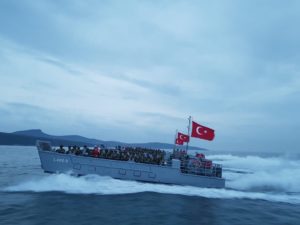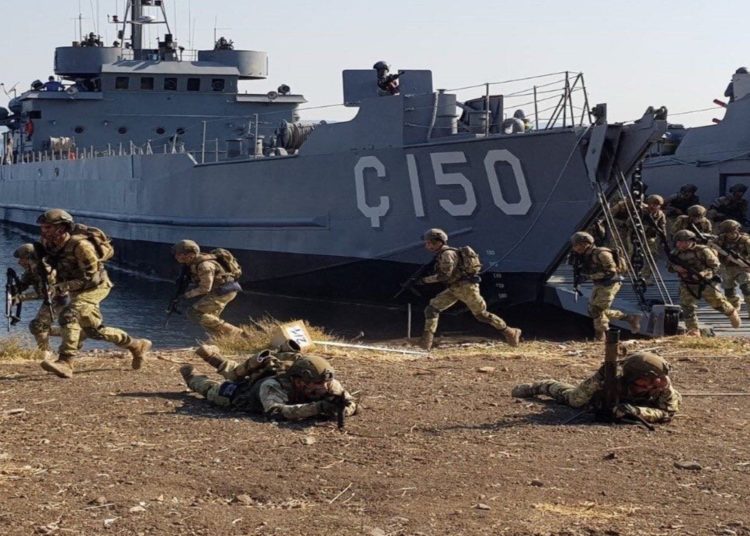Abdullah Bozkurt/Stockholm
A flurry of diplomatic and military activity coupled with increasingly belligerent rhetoric from Turkish officials suggest secret planning has been underway in the government of President Recep Tayyip Erdoğan to create a pretext to possibly invade the eastern Greek islands in the Aegean Sea close to the Turkish mainland.
Some of the road markers indicating that a campaign to make a case for such an invasion is already well underway have been noticed in recent communications and remarks of Turkish government officials as well as military activity in the Aegean. The targets include islands close to Turkey such as Mytilene, Chios, Samos and Icaria, Lemnos and Samothrace.
“These islands were given to Greece with the 1923 Lausanne Treaty and the 1947 Paris Peace Treaties on the condition that it not arm them. But Greece started to violate that in the ’60s. …. These islands were ceded conditionally. If Greece does not stop, the sovereignty of these islands will be questioned. … If necessary, we will issue a final warning,” Turkish Foreign Minister Mevlüt Çavuşoğlu said on state broadcaster TRT on February 10, 2022.
The Turkish foreign minister’s interview on state-run TRT revealed Turkey’s campaign to question the sovereignty of Greece on some islands in the Aegean Sea:
The Erdoğan government has already done some groundwork at the United Nations to justify a possible invasion, notifying the Security Council of what it claimed was a violation of the 1923 Lausanne Treaty and the 1947 Paris Peace Treaties, which established the status of the eastern Aegean Islands.
In a July 13, 2021 letter to the UN Security Council, Feridun Sinirlioğlu, the permanent representative of Turkey to the UN, wrote that “Greece’s continuing deliberate and persistent material breach of the demilitarization provisions of the Lausanne and Paris peace treaties, which are essential to the accomplishment of their object and purpose, constitutes a serious threat to the security of Turkey.”
“Greece is in breach of basic provisions of the treaties under which it acquired sovereignty over the islands, which, from a legal point of view, means that Greece cannot, vis-à-vis Turkey, rely on its title under the same treaties for the purposes of a maritime boundary delimitation,” he added.
Letter to the UN Security Council from the Turkish ambassador to the UN challenging the status of the Greek islands in the Aegean:
The Turkish envoy claimed that Greece, acting unilaterally and cumulatively since 1960 and in clear contravention of the relevant provisions of these treaties, has been in material breach of its demilitarization obligations through troop concentrations, establishing permanent military installations and conducting several military activities in the eastern Aegean Islands.
In a follow-up letter on September 30, 2021, Sinirlioğlu provided a more detailed case, with a six-point legal notice on how Greece had violated the treaty conditions.
“By militarizing the islands in question, Greece has forfeited its right to assert the opposability to Turkey of the treaties mentioned above and the rights which it claims to derive from them,” he wrote.

In contrast, Greece argued that its sovereignty in the islands is not conditional upon any obligation whatsoever, including any obligation to demilitarize them. In a letter to the UNSC on July 28, 2021 Maria Theofili, the Greek ambassador to the UN, challenged the Turkish claims.
“Greece rejects all the Turkish allegations contained in the aforementioned letter with regard to the purported ‘material breach of its demilitarization obligations’, as well as the allegations that Greece’s sovereignty over the Eastern Aegean islands is conditional on their demilitarization, as totally unsubstantiated, arbitrary and in bad faith,” she said.
Letter dated July 27, 2021 from the permanent representative of Greece to the United Nations:
The matter of the eastern Aegean Islands has been deliberately kept on the domestic agenda in Turkey by the Erdoğan government, with officials, partisans and propagandists often challenging the status of these islands and threatening to invade them.
“What was it? They [the Greeks] see a threat from Turkey, and that’s why they violated it [the demilitarization provision]. Is there any such provision [arming the islands in the event of a threat] in the treaty? No! Let’s assume there’s a threat [from Turkey]. You would think you’d be able to prevent that threat with a few soldiers and weapons you put on the islands,” Çavuşoğlu said in his interview.

Nordic Monitor published an article in January showing how Turkish naval academy students would be able to swim the distance between Turkey and the Greek island of Kastellorizo (Meis in Turkish) in a video broadcast on the Defense Ministry Twitter account. Defense Minister Hulusi Akar had also stated that the cadets would swim to Kastellorizo, explaining that it’s very close to Turkey.
Turkish media controlled by the government has intensified its coverage of the Aegean islands in recent weeks with quotes from anonymous Turkish officials and stories run without bylines. That suggests the stories were fed to the media directly from the communications office of President Erdoğan, run by his close aide Fahrettin Altun.
The Erdoğan government campaign against Greece shifted gears with the conversion of the Hagia Sophia museum back into a mosque in July 2020 by a presidential decree. The Hagia Sophia opened as a mosque on July 24, the anniversary of the Treaty of Lausanne, signed between the Allied powers and Turkey, which drew the boundaries of modern Turkey.
Second letter to the UNSC dated September 30, 2021 from the Turkish ambassador to the UN:
The UNESCO World Heritage Site of Hagia Sophia was originally built as an Orthodox Christian cathedral before being converted into a mosque after the Ottoman conquest of what is now Istanbul in 1453. President Erdoğan on July 24 attended the first Friday prayer, an official ceremony, at Hagia Sophia, a crowning achievement for him after 18 years at the helm of Turkish politics.
In October 2020 the Erdoğan government also announced that it would reopen Varosha in the north of the divided island of Cyprus, a beach town that had been fenced off and abandoned since 1974 when the Turkish military intervened. The town is still controlled by the Turkish military. The move was condemned by the international community and the UN Security Council. Yet Turkey moved ahead to fulfill its public declaration and started laying the groundwork for a possible opening up of parts of the town.

According to a source, a band playing electronic music at the former Orthodox Christian Sumela Monastery in Turkey was also planned by Turkish authorities to show Greece that they will play tough. The incident was described by Greece as “offensive” and a “desecration” of the monument, which is a candidate for UNESCO’s List of World Heritage Sites.
Sumela was built in Turkey’s Black Sea region in the 4th century and is being operated as a museum by the Turkish government. Any activity on the site requires the permission of the Turkish authorities.












